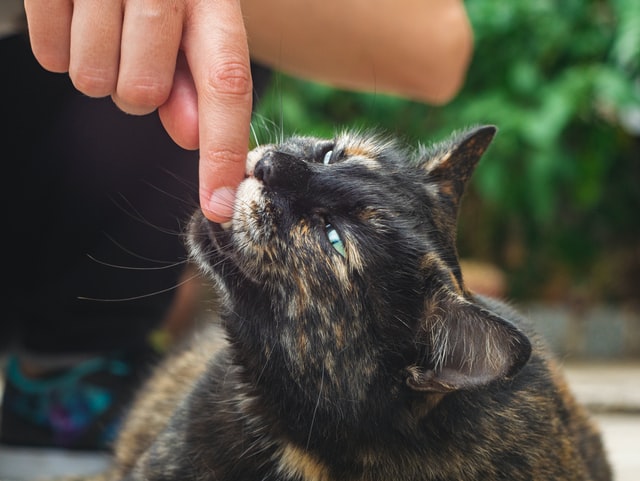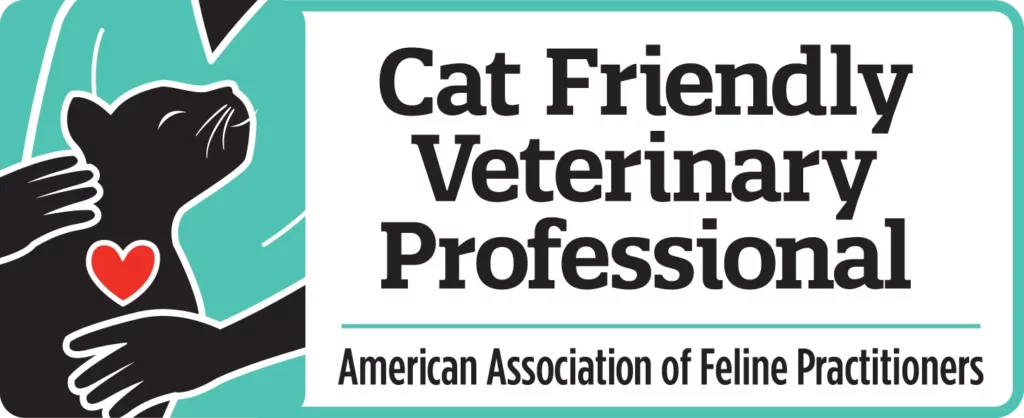May is Mental Health Awareness Month and, as someone who works in human mental health in addition to being a cat behavior consultant, this is a big month for me! In honor of mental health month, I wanted to share a few posts throughout the month about stress, aggression, and a few other mental health related topics in cats.
My Aggressive Cat
For those of who haven’t been the target of a cat bite, you are lucky. What originally sparked my interest in cat cat behavior was my own cat, Zoloft, following me around and biting me repeatedly over the course of many weeks. It was terrifying to say the least, but the worst part was the feelings of fear I had of a cat I loved so deeply. There was a lot of mental conflict and it only made the fear I had that much worse.
At times, I wondered why my normally sweet cat was being so mean. Why was he suddenly being such a little jerk?
Knowing what I know now about cat behavior and cognition, it turns out he wasn’t being mean or a little jerk. At the time, I didn’t take into account the most important perspective of all: my cat.
As someone who got to spend over 5 wonderful years with him, I’d hardly describe Zoloft as an jerk. He was an excellent cat and we spent a lot of time snuggling. There was something else going on and figuring out what that something was ended up being the key to addressing his behavior concerns. If you want to read my full story of what I did, check out my origin story.
Reasons Your Cat Is Aggressive Besides Being A Jerk
While there are a variety of reasons cats bite or scratch, being “mean” is never one of them. If you look at the biting from the cat’s perspective rather than your own, you can usually start picking out what the real cause of the aggressive behavior is. Reframing the behavior in this way also helps you preserve your relationship with your cat and allows you to start addressing the real cause of it.

In particular, I want you to think of one often missed possibility about why your cat may be being aggressive: anxiety.
Anxiety As A Cause of Aggression
In nature, it really doesn’t benefit cats to get into fights. Cats risk injury or even death if they get into a spat and don’t emerge victorious. Because of this, it benefits the cat to take steps to prevent an actual altercation.
House cats are still animals and they still maintain a lot of their ancestral tendencies, including an aversion toward fighting. This means if a cat is biting, scratching, or otherwise exhibiting aggressive behavior, something big is going on. In many cases, your cat is actually really afraid.
Cats may act aggressively due to anxiety for a variety of reasons. The cat may feel cornered and see no other way to get out of the situation. They may have learned based on past experiences that acting a certain way ultimately results in a reduction in anxiety. Even a single bad experience for some cats can cause them to have a long term fear of something.
While I often hear from clients that their cat is unpredictably aggressive, when we end up actually looking at the cat’s behavior we discover there are subtle signs of impending aggression. Understanding cat body language is important as cats are excellent communicators. They may have attempted to send warning signals that were either not noticed or ignored so they feel they need to escalate the situation.
Additive Effects of Stress
In some situations, cats may act aggressively following stressful events that normally wouldn’t set them off. The cat may experience something called trigger stacking where the reason your cat is acting aggressively is actually reasons your cat is acting aggressively. Basically, there may even be something else going on that is causing them to feel threatened and a relatively small event sends them over the edge. The additive effects of the stress make the problem worse.
Think of it like this: you’re having a bad day. On your way to work, you get cut off and there’s traffic. You spill coffee on yourself on your way into the office, which you barely make it to work on time. Upon your arrival, you find out a customer/client/patient/whoever filed a minor but annoying complaint against you. Nothing bad will come of it, but it still has to be dealt with.
After work, you return to your car and notice it: bird poop. There is bird poop on your windshield.

While you normally may have brushed off the bird poop on your windshield as no big deal (you can just run the windshield wipers or do a quick car wash, after all), today it sets you over the edge. You end up spending 10 minutes in your car crying because it was just too much.
This is how your cat feels when they’re experiencing trigger stacking.
Had each stressor (jerkwads cutting you off, traffic, spilled coffee, almost being late, a minor complaint, bird poop on your windshield) occurred on a separate day, you probably would have moved about your life without much thought. Instead, you’re now crying in your car because each stressor was too much to deal with. You also didn’t have time to decompress from each stressful event.
If your cat is in an environment that constantly is bombarding them with stressors or they have repeated stressors happen in a short period of time, they’re going to find even minor events to be overwhelming. If your cat is prone to aggress as a way to defend themselves or try to escape the stressors, you may find them biting or scratching at you.
The best thing you can do in these situations is to work to reduce your cat’s anxiety and fear. This could involve removing the source of fear or adding in a pheromone diffuser. In situations where it may not be possible to remove the source entirely, you can work with your cat to get them gradually used to the source of anxiety. In some cases, you may even be able to create a positive association so they willingly participate in formerly stressful things like taking medications or getting their nails trimmed.
Frustration Can Cause Cat Aggression
Spoiler alert for those that plan to read my origin story later: In my case, my sweet Zoloft ended up being frustrated. I wasn’t paying enough attention to him and he was bored and frustrated. His needs weren’t being met.
We, unfortunately, see cats as easy pets when really, the things that make them easy are the result of us neglecting their basic needs. Not taking care of their basic needs is not only not great for their welfare, but it can lead to behavior problems including aggressive behaviors.
If your cat doesn’t have an outlet for their natural instinct to hunt by getting plenty of play, they’ll end up trying to hunt anything that looks remotely like prey. That could end up being someone in your home! This is especially true of younger cats as aggression in kittens can sometimes be an attempt at playing. The frustration could also be the result of not being able to hunt something they see outside or fear due to a fight between cats.
Preventing And Addressing Frustration
What can be done if your cat is frustrated or bored? Adding some fun cat enrichment is a great first step. That means things like increasing the amount of interactive play you are doing with your cat, adding mental stimulation via training or puzzle feeders, and making their environment cat friendly. If there is an identifiable source of frustration, removing it if possible is a great idea.
One specific tip that I see frequently with clients: outdoor sources of frustration can be tough to address. You can’t really stop birds from flying into your yard. You can, however, make it so your cat can’t see them. Using a semi-transparent window film will allow light to get in but will obscure your cat’s view of the outdoors as long as nothing comes right up to the window. If that isn’t enough, you may want to consider a one way mirror film over part of the window to completely block your cat’s view without making it totally dark.
Medical Reasons For Cat Aggression
Not every reason for cat aggression is behavioral. I always encourage my clients to make sure medical explanations are ruled out before we begin working together. Why? If you attempt the behavioral interventions but your cat continues to feel like crud due to an illness, they’re still going to have the underlying reason for the aggression unaddressed.
Think about the last time you were sick: how patient and forgiving were you? Probably not very, or at least you were less patient and forgiving that you normally may have been. You may not have snapped at someone, but given the right circumstances you may have been tempted.
Cats experience something similar where, if they’re not feeling their best, they may prefer to be left alone and be more likely to act aggressively. If they’re in pain and you touch somewhere that hurts, they may bite or swat to get you away. Can you really blame them?
According to PetMD, some common medical causes of aggressive behavior in cats include arthritis, infections, injuries, dental problems, and neurological disorders. This is hardly a complete list and there are many potential medical reasons that your cat may be in pain. My suggestion? Set up a veterinarian appointment so they can come up with an explanation.
Of course, there are many more possible sources of aggression in cats. If you still aren’t sure why your cat is showing aggression toward you or someone else, getting a professional assessment of your cat’s behavior by your veterinarian or a cat behavior professional is a good next step. They can help you figure out what is happening and what to do about it!










